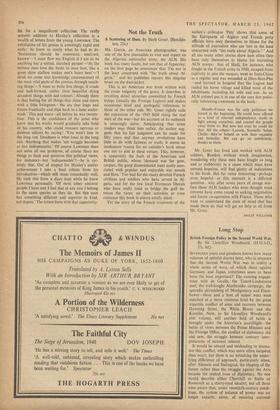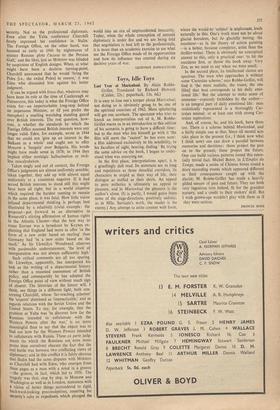Long Stop
SEVENTEEN years and goodness knows how many volumes of spiteful diaries later, who is unaware that the Second World War. was in reality a whole series of wars, of which those against Germany and Japan sometimes seem to have been the least important? The running engage- ment with de Gaulle, the Tizard-Lindemann duel, the well-fought Alanbrooke campaign, the sporadic skirmishing of Montgomery and Eisen- hower—these and a host of minor wars were matched at a more ominous level by the great tripartite conflict of aims and interests between Downing Street, the White House and the Kremlin. Now, in Sir Llewellyn Woodward's able volume, still another field of battle is brought under the historian's searchlight—the battle of views between the Prime Minister and the Foreign Office, the conflict of diplomacy old and new, the struggle between contrary inter- pretations of national interest.
It would be absurd and misleading to drama- tise this conflict, which was more often incipient than overt; but there is no mistaking the under- lying difference of approach, particularly when, after Alamein and Stalingrad, the shaping of the future rather than the struggle against the Axis becarrie the central issue of diplomacy. No one would describe either Churchill or Stalin or Roosevelt as a starry-eyed idealist; but all three were aware that, under twentieth-century condi- tions, the system of balance of power was no longer capable, alone, of ensuring national
security. Not so the professional diplomats. Even after the Yalta conference Churchill firmly expressed his confidence in Stalin. The Foreign Office, on the other hand, was haunted as early as 1941 by nightmares of sinister Russian plots (`access to the Persian Gulf,' and the like), just as Molotov was blinded by suspicions of English designs. When, at what might have been a decisive turning-point, Churchill announced that he would 'bring the Poles [i.e., the exiled Poles] to reason,' it was Eden who dissuaded him against his better judgment.
It can be argued with force that, whatever may have been its role at the time of Castlereagh or Palmerston, this today is_ what the Foreign Office exists for—an imperturbable long-stop behind an impetuous Minister, or (if you prefer the metaphor) a snarling watchdog standing guard over British interests. The real question, how- ever, is whether the standards by which the Foreign Office assessed British interests were any longer valid. Eden, for example, wrote in 1944 that we could not 'give up an interest in the Balkans as a whole' and ought not to offer Moscow a `bargain' over Bulgaria. His words might have made sense in 1878; in 1944 they implied either nostalgic hallucination or reck- less miscalculation.
Taken singly and out of context, the Foreign Office's judgments are almost uniformly sensible; taken together, they add up with almost equal uniformity to a consistent negative. If it had served British interests to stand still this might have been all right; but in a world situation which required the hardest running to remain in the same place, it was fatal. How little vision infused departmental thinking is perhaps best illustrated by a relatively trivial example : the proposal—put forward as an alternative to Roosevelt's stirring affirmation of human rights in the Atlantic Charter—that the best way to rouse Europe was a broadcast by Keynes ex- plaining that England had more to offer 'in the form of a new order based on sterling' than Germany had `in a new order based on the mark.' As Sir Llewellyn Woodward observes with pardonable understatement, 'the level of interpretation was not always sufficiently high.'
Such critical comments are all too sparing. Sir Llewellyn, apparently, has interpreted his task as the writing of a departmental history rather than a reasoned assessment of British Policy, and consequently he has adopted the Foreign Office point of view without much sign of dissent. The historian of the future will, I think, see things in a different light, both con- cerning Churchill, whose 'far-reaching schemes' the 'experts' dismissed as 'impracticable,' and as regards relations with the Soviet Union and the United States. To say, for example, that the problem at Yalta was `to discover how far the Russians intended to collaborate with the Western Powers after the war,' is no more meaningful than to say that the object was to find out how far the Western Powers intended to collaborate with Russia. These ex parte judg- ments (to which the Russians are, even more prone than ourselves) obscure the fact that the real battle was between two conflicting views of diplomacy; and in this conflict it is fairly obvious that Stalin had the same disputes with Molotov as Churchill had with Eden, who emerges from these pages as a man with a mind in a groove —the groove, in fact, which led to 1956. The tragedy was that, step by step, in Moscow and Washington as well as in London, statesmen with a vision of better things surrendered to rigid, backward-looking preconceptions, resorting for security's sake to expedients which plunged the
world into an era of unprecedented insecurity. Today, when the whole conception of summit diplomacy is under fire and we are being told that negotiation is best left to the professionals, it is more than an academic exercise to see what use the Foreign Office made of its opportunities and how its influence was exerted during six decisive years of war.
GEOFFREY BARRACLOUGH



































 Previous page
Previous page